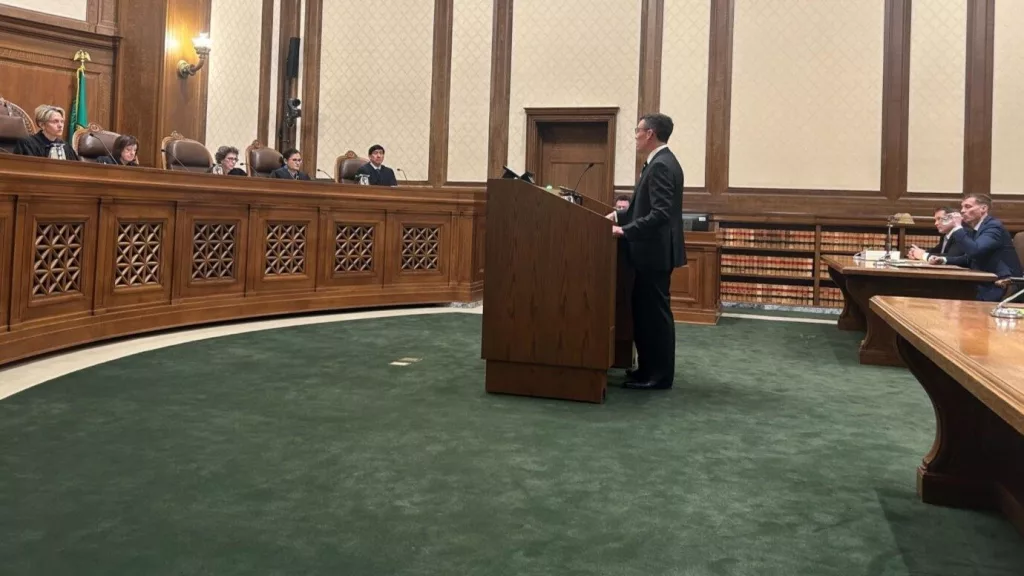On Tuesday morning, attorneys for the state and a southwest Washington gun shop challenging the law made their cases to the justices.
Lawyers for Gator’s Custom Guns argued the ban on selling magazines that can hold more than 10 rounds violates the clause of the state constitution that protects “the right of the individual citizen to bear arms in defense of himself, or the state.”
The U.S. Supreme Court has ruled the Second Amendment of the U.S. Constitution protects firearms that are “in common use” and are “typically possessed by law-abiding citizens for lawful purposes.”
“Just the simple fact that citizens of the nation and the state have overwhelmingly chosen magazines of capacity more than 10 rounds necessarily leads to the conclusion that they are used for self-defense,” said Austin Hatcher, an attorney from the Spokane area. “They’re used for lawful purposes.”
On the other side, lawyers from the state attorney general’s office argued the prohibition should stand because these magazines aren’t necessary for a gun to work. Since they are accessories, the ban doesn’t violate the state or federal constitutions, they argued.
Solicitor General Noah Purcell called the magazines the “universal tool of choice” in mass shootings.
“Nothing in Washington’s Constitution or the Second Amendment requires states to allow the sale of firearm accessories that have virtually no utility for self-defense and, instead, are routinely used in mass shootings,” Purcell told the justices.
Washington’s ban on high-capacity magazine sales took effect about two and a half years ago. The state is among at least 14 nationwide with similar restrictions. These laws have attracted lawsuits as lower courts work through how to interpret a 2022 U.S. Supreme Court ruling that set new limits on gun regulations.
Justice Sheryl Gordon McCloud asked Purcell if components of a gun, like a barrel, are not technically a firearm, does that mean the state could ban them?
A restriction impairing the right to bear arms would be a problem, Purcell conceded. But the magazine law does not cross that line, he said, because “there is no firearm that requires a large capacity magazine to operate.”
Purcell also argued people defending themselves don’t need more than 10 rounds. Hatcher countered that the state constitutional right goes beyond self-defense.
Legal lingo
Arguments in the dispute center on several U.S. Supreme Court rulings over the past two decades.
In a pair of cases, District of Columbia v. Heller in 2008 and McDonald v. City of Chicago in 2010, the high court ruled individual Americans have a right to bear arms that must be respected under federal, state and local laws.
But the Heller ruling also said Second Amendment rights are “not unlimited” and set out a test for deciding whether weapons could be regulated because they are “dangerous and unusual.”
If a weapon is dangerous and unusual, then the government can prohibit it, explained Joseph Blocher, the co-founder of the Duke Center for Firearms Law, in an interview last week. “If it is not, that is if it is in common use for lawful purposes, then it cannot be prohibited.”
More recently, the Supreme Court ruled in New York State Rifle & Pistol Association v. Bruen that state firearm laws must adhere to the nation’s “historical tradition of firearm regulation.”
That’s left judges having to infer how modern weapons like large-capacity magazines and semiautomatic rifles square with laws written more than a century ago.
Hatcher argued there is no historical precedent to underpin Washington’s ban on the sale of the magazines. “I don’t think there are any analogous laws, and the only ammunition capacity laws were from the Prohibition era, which is much too late,” he said.
But Purcell said the comparison doesn’t have to be so specific. He used the example of Bowie knives. As the knives rose in popularity in the 1800s, laws cropped up to ban them. The situation today with ammunition magazines is similar, he argued.
“There doesn’t have to be a twin regulation from the late 1700s for something that didn’t exist in the late 1700s, as is the case here,” Purcell said. “What we look for is the principles that underlie old laws and whether they’re consistent with principles underlying” the current law.
In a recent application of Bruen, federal appeals court judges struck down a federal law prohibiting some people under restraining orders from having guns because it wasn’t in line with law when the U.S. Constitution was ratified.
The U.S. Supreme Court overturned that ruling last year. In doing so, the justices noted courts could use general principles, not just exact matches, when comparing modern gun laws to historical regulations.
And Blocher noted laws like Washington’s have largely been upheld across the country, “so in essence, I would think the state should have some reason to feel confident.”
But even Justice Steven Gonzalez acknowledged the difficulty of applying the evolving tests the U.S. Supreme Court has laid out for gun laws. “I’m confused by our national Second Amendment jurisprudence, and I’m confused by Bruen,” Gonzalez said.
How we got here
Democrats passed the ban on large-capacity magazine sales on a party-line vote in 2022 after years of trying.
Gator’s Custom Guns in Kelso filed a legal challenge to the ban. Then-Attorney General Bob Ferguson responded by suing the shop, owned by Walter Wentz, alleging it had flouted the new state law by continuing to sell the banned magazines.
In an interview after Tuesday’s hearing, Wentz said the state’s bans on high-capacity magazines and assault weapons led to a 40% decrease in sales at his shop.
Last April, Cowlitz County Superior Court Judge Gary Bashor struck down the law, finding the ban violated the Second Amendment and language in the state constitution granting a right to bear arms for self-defense.
Within hours of Bashor’s decision, at the request of state attorneys, a state Supreme Court commissioner agreed to put a pause on the ruling so the prohibition could remain in place.
A couple weeks later, the commissioner, Michael Johnston, extended the stay until the case was resolved and it remains in effect.
Both sides asked the state Supreme Court to hear the case. Justices agreed to do so last June.
Wentz said Tuesday he was surprised how “impartial” the justices appeared.
On Monday, the Legislature began its 105-day session, in which Democrats hope to pass a number of new gun laws. One would require a state permit to purchase firearms. Others would restrict guns in parks frequented by children, public buildings and county fairs and ban bulk purchases of ammunition.
This story first appeared on Washington State Standard.





